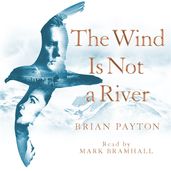The Wind Is Not a River
Brian Payton
Age 16 +Synopsis
April 1943. In the bloody turmoil of war, John Easley, a journalist mourning his lost brother, is driven to expose a hidden and growing conflict: the Japanese invasion and occupation of Alaska's Aleutian Islands. But when his plane is shot down he must either surrender or struggle to survive in a harsh wilderness.
Three thousand miles to the south, Helen Easley cannot accept her husband's disappearance-an absence that exposes her sheltered, untested life. Desperate to find and be reunited with him, she sets out on a remarkable journey from the safety of her Seattle home to the war in the north.
An evocative, richly atmospheric tale of life and death, commitment and sacrifice, The Wind Is Not a River, perfect for fans of Cold Mountain, is a gripping story of survival that illuminates the fragility of life and the fierce power of love.
'Beautifully written, lyrical and elegiac, The Wind Is Not A River is a novel you must read . . . John Easley's struggle to survive and his wife Helen's struggle to find him form the most triumphant and heartbreaking love story I've read in years' David Vann, author of LEGEND OF A SUICIDE
This is sweeping epic romance, wartorn drama: think Cold Mountain, think The English Patient . . .Radio 2, Claudia Winkleman show
Perfect storm of a wartime love story... The historical background of The Wind Is Not a River is well done; Payton has trained a spotlight on an obscure and not very creditable episode of US history, revealing the shabby treatment of the native Aleuts. But this is mainly a good old fashioned tear-jerker, written with beautiful clarity and feeling. It cries out to be a black and white 1940's movie, with a swirling score and Gary Cooper and Joan Fontaine in the leading role.The Times
A haunting love story . . . engaging and unsettling . . . The novel vividly describes the Aleutians, an 1,100-mile-long chain of islands, that, Payton writes, 'dares to separate the North Pacific from the Bering Sea' . . . Payton writes some lovely sentences . . . The novel doesn't romanticize war. It emphasizes the brutality and utter confusion of battle. It also weaves in what happens to the native Aleutians - who call themselves Unangan, or 'original people' - forced by the U.S military into internment camps. Readers will be propelled by a desire to find out what happens to John and Helen. Be prepared for an unexpected twist. Along the way, readers will learn not just about a fascinating and largely forgotten slice of American history, but what it felt like to live through it.USA Today

